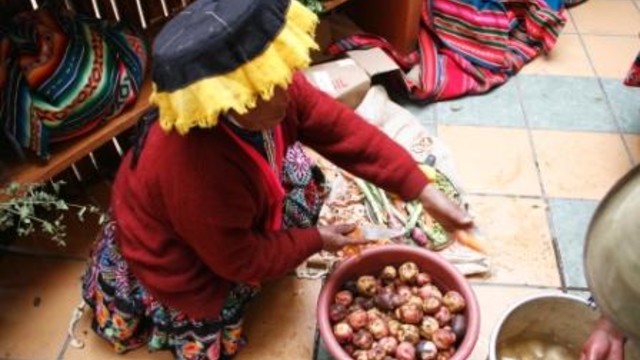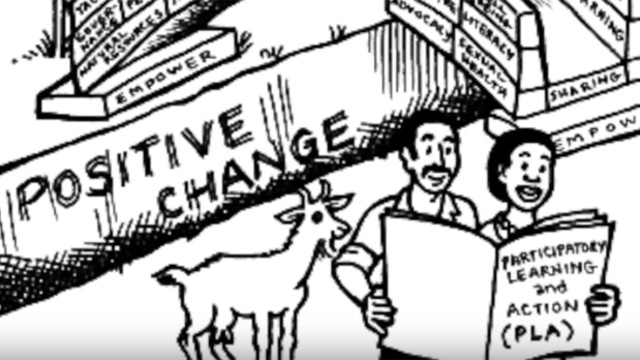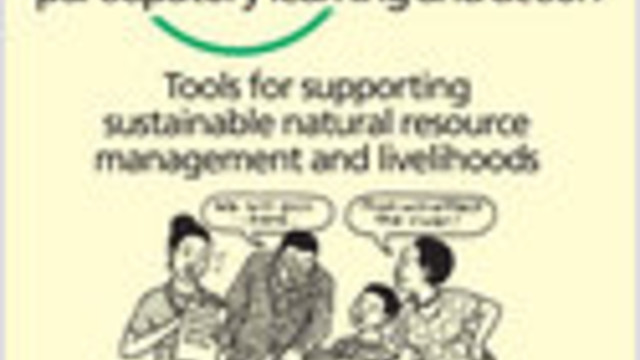PLA 34: Learning from Analysis
The special theme section of this issue of Participatory Learning and Aaction looks at ‘analysis’: the tricky process of ‘making sense’ of the information derived from participatory approaches.
- Participatory Learning and Action: a journal for newcomers and experienced practitioners alike
- About PLA: Background, aims and history of the journal
- Explore the archive: browse and download issues or individual articles
February 1999
Guest Editors: Irene Guijt and Su Braden
While it is easy to generate much interesting and unusual information through participatory processes, it is often very difficult to make sense of the mountain of data with which we are left. Where does participation in analysis begin and end? When does it happen, and how and by whom is learning represented? How can serious analysis ensure that local people learn about the value of their lives and gain the confidence to represent their own choices?
Articles in the theme section discuss what happens when data is ‘collected’, discussed, summarised and shared, when priorities are made, and action points are agreed. It includes examples from Uganda, Peru, UK, Malawi, India, Brazil and El Salvador. The articles examine who is involved in analysing information at different stages in a participatory process and discuss how critical reflection can, and should, become part of any participatory process.
This work is licensed under the Creative Commons Attribution-Non-Commercial-Share Alike 3.0 Unported License. Content can be freely reproduced for non-commercial purposes, provided the source is fully acknowledged.
Follow the links below to download the whole issue or individual articles in pdf format.
Contents
Pushing the limits of mapping and wealth ranking
Anton Simanowitz
Participatory assessment and the twenty points of progress program: the experience from Mexico
Gary M. Woller and James B. Mayfield
Public participation and GIS: report back
Gavin Jordan
Learning from analysis
Ensuring reflection in participatory processes
Irene Guijt and Su Braden
Beyond the good discussion: the issues matrix for analysing intra-communal difference in PRAP
Grace Mukasa and Geoffrey Mugisha
Finding a voice through analysis of the everyday experience of poverty
Maria Chase, Joan Pine and Sam Swaby, with Su Braden
Interaction for irrigation: how analysis guided a construction project in Peru
Natasha van Dijk
Order from chaos? making local data relevant for policy audiences
S. Rengasamy, P. Bala Murugan, John Devavaram and Simon Croxton
PRA that supports local development: the experience of developing a municipal rural development plan in Tombos, Brazil
Andréa Alice C. Faria
Communities meet policy-makers through video-supported analysis: rural energy issues in Malawi
Su Braden and Valerie Nelson
Making sense of community wellbeing: processes of analysis in participatory wellbeing assessments in South London
Andrea Cornwall
Rejecting "the manual" for more critical and participatory analysis: REFLECT's experience in El Salvador
Bimal Kumar Phnuyal
Feedback: Barriers to the institutionalisation of PRA in NGOs in Nepal
Marion Gibbon with a response from Michel Pimbert
A brief guide to training in participatory methods in the field
Tips for Trainers: Introducing the 'H-form' - a method for monitoring and evaluation
Susan Guy and Andrew S.Inglis



